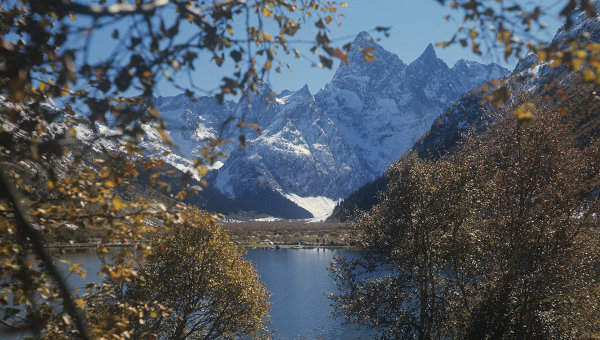
High Expectations for North Caucasus Tourism Development Matched by Faltering Government Support
Publication: Eurasia Daily Monitor Volume: 10 Issue: 8
By:

On December 27, the Russian government decreed that the Stavropol region will join the grand North Caucasus tourism development project. What is intriguing about the decision is that the predominantly ethnic Russian-populated Stavropol region had periodically signaled that it did not want to be associated with the North Caucasus, which is predominately non-Russian and markedly poorer than Stavropol. The North Caucasus Resorts company expanded the scope of its activities steadily from the initial five republics of the North Caucasus, Adygea, Dagestan, Kabardino-Balkaria, Karachaevo-Cherkessia and North Ossetia, where world-class ski resorts should have been built, to another North Caucasian republic, Ingushetia, then to Krasnodar region and now to Stavropol region. The impetus for the construction of ski resorts gave way to a more complex approach, as government-supported North Caucasus Resorts stated it would build seaside resorts in Dagestan on the Caspian. Expansion into Stavropol region’s Kavkazskie Mineralnye Vody area provides the company with opportunities to develop mineral waters resorts, which were once famous and popular in Russia. The initial area covered by the special economic zone allotted by the government to North Caucasus Resorts in 2010 was 580 square miles. A little more than two years later, that area has doubled to 1,160 square miles. The initial costs of the project were estimated at $15 billion, and after the expansion the costs are now estimated to be $26 billion (https://www.kommersant.ru/doc/2101590).
The Kavkazskie Mineralnye Vody area is located in southern Stavropol region and is a collection of several small cities, including Pyatigorsk, Kislovodsk, Zheleznovodsk and Essentuki. The area has special status within the Stavropol region: it has the highest population density and, arguably, the highest ethnic diversity because it borders Kabardino-Balkaria and Karachaevo-Cherkessia. The region has been known for numerous ethnic conflicts—specifically, between the Cossacks, who are tacitly supported by the local government, and the North Caucasian groups. Some of the North Caucasians, such as the Kabardins and Karachays, are natives to this area, which was taken over by Russia in the 19th century.
The North Caucasus Resorts company appears to be interested in further diversifying its activities in the region. In December 2012, Evrazia Energy Holdings considered acquiring the North Caucasus electric power network that virtually controls all electricity supplies in the region. Evrazia Energy Holdings is a joint venture of North Caucasus Resorts and the Korean state company Korea Western Power (KOWEPO) (https://www.kommersant.ru/doc/2093052). On December 12, the newspaper Vedomosti reported that North Caucasus Resorts had requested government assistance in setting up its own low-cost air carrier to simplify the transportation of Russian tourists traveling back and forth to North Caucasus resorts. The estimated cost of such a venture is $2–3 billion, and it would require government support until 2026, when the rising numbers of tourists presumably should offset the air company’s costs (Vedomosti, December 12, 2012).
From the very beginning, investment analysts were concerned that the security risks were too high to expect any returns from investing in the development of the North Caucasus. Hundreds of people are killed every year in violent attacks in the region. Infrastructure also at times comes under attack. So estimates that 10 million tourists a year could visit the North Caucasus resorts seemed excessively optimistic. In fact, it is not clear whether there would be 10 million visitors per year from Russia proper even if the situation in the North Caucasus were completely calm. Skiing is a very specific type of recreational activity and is not cheap. Foreign tourists are even less likely to visit the North Caucasus in large numbers due to the security risks, notorious Russian visa hurdles and the unfavorable ratio of price to quality of service.
It gradually transpired that the Russian government did not intend to invest directly in North Caucasus tourism development; rather, it wished to attract investors under government guarantees. Even the guarantees did not arrive immediately. It was only at the end of 2012 that Moscow announced it would allot $1 billion for 2013 as guarantees for investments in the North Caucasus tourism project. According to the chairman of the board of directors of the North Caucasus Resorts company, Akhmed Bilalov, government guarantees would cover investment projects worth at least $100 million. In addition, Bilalov said, the government provided subsidies for low interest credits that could attract companies, as well as low taxes (https://www.ncrc.ru/ru/news/pravitelstvo-rf-utverdilo-predostavlenie-gosgarantiy-na-pokrytie-100-zaemnyh-sredstv).
Lower than expected revenues for the Russian state significantly curbed the government’s plans for the development of the North Caucasus. Even though North Caucasus Resorts regularly boasts of having talks with potential investors or receiving government money, there is little evidence of actual investments and construction work. In fact, after lengthy deliberations, Russian government agencies delivered surprising news in December 2012. The cost of the state program for the North Caucasus development in 2013–2025 was lowered from $180 billion to $83 billion. More importantly, for the period of 2013–2020, the government plans to attract $7.5 billion in investments, of which only 10 percent, or $750 million, should come from the state budget. The bulk of the investments, over $70 billion, should arrive after 2020, which is well beyond the Russian government’s planning horizon. Even these figures are imprecise. According to the Russian government’s latest plans, all state programs will be subject to public hearings (https://www.kommersant.ru/doc/2089450). Bearing in mind the widespread negative attitudes toward the North Caucasians among ethnic Russians, public hearings on the state program for financing the North Caucasus promise the program will have a very rocky future.




